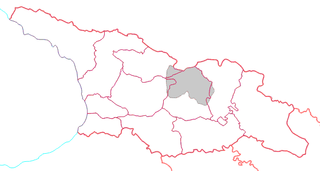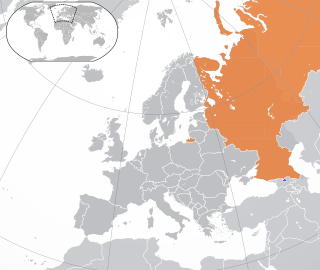Related Research Articles

South Ossetia, officially the Republic of South Ossetia – the State of Alania, or the Tskhinvali Region, is a de facto state in the South Caucasus recognised by most countries as part of Georgia. It has an officially stated population of just over 53,000 people, who live in an area of 3,900 km2, south of the Russian Caucasus, with 30,000 living in Tskhinvali. The separatist polity, Republic of South Ossetia, is recognized as a state by Russia, Venezuela, Nicaragua, Nauru, and Syria. While Georgia lacks control over South Ossetia, the Georgian government and most members of the United Nations consider the territory part of Georgia, whose constitution designates the area as "the former autonomous district of South Ossetia", in reference to the South Ossetian Autonomous Oblast disbanded in 1990.

Java is a town of approximately 1,500 people in Georgia. According to Georgia's current official administrative division, Java is a main town of Java district in the north of Shida Kartli region. According to the South Ossetian side Dzau is an administrative center of Dzau district. The town is situated on the southern slopes of the Greater Caucasus, within the Greater Liakhvi Gorge, 1,040 m (3,412 ft) above sea level.

Eduard Dzhabeyevich Kokoyty is the former President of the partially recognized state South Ossetia. His term in office lasted just under ten years, beginning December 2001 and ending December 2011.

The Georgian–Ossetian conflict is an ethno-political conflict over Georgia's former autonomous region of South Ossetia, which evolved in 1989 and developed into a war. Despite a declared ceasefire and numerous peace efforts, the conflict remained unresolved. In August 2008, military tensions and clashes between Georgia and South Ossetian separatists erupted into the Russo-Georgian War.

UTC+03:00 is an identifier for a time offset from UTC of +03:00. In areas using this time offset, the time is three hours later than the Coordinated Universal Time (UTC). Following the ISO 8601 standard, a time with this offset would be written as, for example, 2019-02-08T23:36:06+03:00.

The Provisional Administration of South Ossetia is an administrative body that Georgia regards as the legal government of South Ossetia. The administration was set up by the Georgian government as a transitional measure leading to the settlement of South Ossetia's status. As of 2007, Georgia is proposing the status of autonomous republic within the Georgian state. The area mainly lies within the Shida Kartli region.

The Russo-Georgian War was a war between Georgia, Russia and the Russian-backed self-proclaimed republics of South Ossetia and Abkhazia. The war took place in August 2008 following a period of worsening relations between Russia and Georgia, both formerly constituent republics of the Soviet Union. The fighting took place in the strategically important Transcaucasia region. It was regarded as the first European war of the 21st century.

Abkhazia and South Ossetia are disputed territories in the Caucasus. The central government of Georgia considers the republics under military occupation by Russia. They are both partially recognised as independent states by Russia, Venezuela, Nicaragua, Nauru and Syria, while Vanuatu recognises only Abkhazia but not South Ossetia. Russia's initial recognition of the independence of Abkhazia and South Ossetia occurred in the aftermath of the Russo-Georgian War in 2008.

Abkhazia–Russia relations is the bilateral relationship between the Republic of Abkhazia and the Russian Federation. Russia recognised Abkhazia on 26 August 2008, following the August 2008 South Ossetia war. Abkhazia and Russia established diplomatic relations on 9 September 2008.

Russia—South Ossetia relations refers to the bilateral relationship between Russia and the Republic of South Ossetia, a disputed region in the South Caucasus, located on the territory of the South Ossetian Autonomous Oblast within the former Georgian Soviet Socialist Republic.

The Armed Forces of South Ossetia is the military of the partially recognised state of South Ossetia. The force consists of 16,000 soldiers: 2500 officers and active-duty soldiers and 13,500 reservists. It includes an Army and an Air Corps.

Both sides of the 2008 war between Russia and Georgia blamed each other for starting the war.
Gerasim "Rezo" Georgievich Khugayev is an Ossetian politician a former Prime Minister of the Republic of South Ossetia. He is the only South Ossetian Prime Minister to serve more than one time, at this date. He first served from October 1993 until May 1994 under Head of State Lyudvig Chibirov, and then again from December 2001 until August 2003, as the first Prime Minister appointed by President of South Ossetia Eduard Kokoity.
Aleksandr Apollonovich Shavlokhov is a South Ossetian politician and former Prime Minister, from 1996 until August 1998.

Tamarasheni is a former village in Georgia, within the territory controlled by separatist South Ossetia, some 0.5 km north of Tskhinvali.

Leonid Tibilov is a South Ossetian politician who served as the President of South Ossetia from 2012 to 2017 after winning the 2012 South Ossetian presidential election.
South Ossetia–United States relations refers to the diplomatic relations between South Ossetia and the United States. South Ossetia and the United States do not have official diplomatic relations due in large part of the United States recognizing the region of South Ossetia as part of Georgia. A position recognized by Georgia and the majority of United Nations member states. The United States' lack of relations with South Ossetia has been one of the focal points of conflict between Russia and the United States since the Russo-Georgian War in which the United States blamed Russia for invading sovereign Georgian territory.

The Georgia–Kiribati relations are the diplomatic relations between Georgia and the Republic of Kiribati.
Abkhazia–United States relations refers to the diplomatic relations between Abkhazia and the United States. Abkhazia and the United States do not have official diplomatic relations due in large part of the United States recognizing the region of Abkhazia as part of Georgia. A position recognized by Georgia and the majority of United Nations member states. The United States' lack of relations with Abkhazia has been one of the focal points of conflict between Russia and the United States since the Russo-Georgian War in which the United States blamed Russia for invading sovereign Georgian territory.
References
- ↑ Time zone in Tskhinvali, Georgia. TimeAndDate.com.